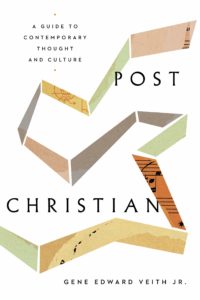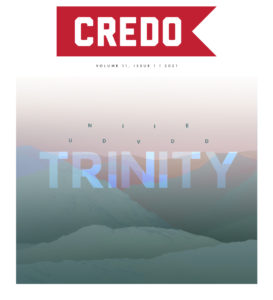The Christian today must be the outdated nerd in the back of the room instead of the most educated lawyer or doctor. Modern society automatically assumes faith in God resigns a person to the lower class of blue-collar workers with conservative prejudices, the country of farmers with rosy-glassed views of life, or misogynistic marriages and families. No longer are Christ’s followers dignified ambassadors of an eternal kingdom, a community embodying a holy temple, indwelled by a Spirit more powerful than Satan and death—because there are no such things. There are no kingdoms beyond this earth, supernatural realities, or even death.  Why? Because society knows better. But what does it really know? This is the query Gene Edward Veith seeks to answer in his recent book, Post-Christian: A Guide to Contemporary Thought and Culture (Crossway). Published recently enough to include thoughts on the legalization of same-sex marriage, #MeToo movement, transgenderism, and Donald Trump’s presidency, Veith embarks on a study of “what we are left with when we try to abandon the Christian worldview” (18). He does not systematize, but rather overviews the various ways a “post-Christian” culture has constructed its own definition of reality, the body, society, and religion (18). This leads him to a frightening world, but not one without hope.
Why? Because society knows better. But what does it really know? This is the query Gene Edward Veith seeks to answer in his recent book, Post-Christian: A Guide to Contemporary Thought and Culture (Crossway). Published recently enough to include thoughts on the legalization of same-sex marriage, #MeToo movement, transgenderism, and Donald Trump’s presidency, Veith embarks on a study of “what we are left with when we try to abandon the Christian worldview” (18). He does not systematize, but rather overviews the various ways a “post-Christian” culture has constructed its own definition of reality, the body, society, and religion (18). This leads him to a frightening world, but not one without hope.
In Part I of his book, Veith examines the way our post-Christian world defines reality according to the self. He traces this view of reality back to Emmanuel Kant, the father of the enlightenment and constructivism, who believed we could not “know anything outside of ourselves certainly and directly” (30-31). Veith believes his work led to our present-day “social constructivism and personal constructivism,” where reality, oppression, and moral imperatives are ruled by individual groups and people (35). The post-Christian world is devoid of objective, communal ethics. There is only the monster of contemporary activism and modern-day partisan politics grouped around whatever someone deems right.
Veith also delves into the progress of modern science, but even its wholesome wonders are tainted by self-orientation. “Nature is void of meaning; the self can bestow meaning,” he writes. “Nature knows nothing of good and evil, beauty, joy, purpose, or spirituality. Those can be found only in terms of the self” (39). Virtual worlds serve as one technological vehicle for such self-advancement. Veith attributes the problem of “conflicting personalities and identities” to the dark sides of social media, entertainment, and video games (71). Our technological identities are ruled by none other than the self, which reigns supreme.
In Part II, Veith observes the body is also oriented around the self, as evidenced by the fourteen “genders” listed in the Gender Master List (133-134). But this vein of post-Christian thought is pervaded by multiple levels of motivation, selfish power-grasping being the most prominent (19-20). The sexual abuse of women, brought to the light by the #MeToo movement, is an assertion of male power over the female body (141-142). And if some are not inclined to commit the real crime, sex robots give the man an allusion of the sexual power he could have over a real woman (112). Reproductive technology give both men and women the illusion of power over their offspring (117-124). Feminists rise up and demand society give them power, but they then justify the murder of their helpless babies by the inherent virtue of their will (once again, asserting their power over other human beings—their own children) (20).
All these social issues are fueled by an unfettered appetite for sex, and the unfettered appetites have run their course with disastrous effects, Veith concludes (167). Children birthed by reproductive technologies feel estranged from their biological parents, and reproductive technologies leave us with the frightful possibility of incest (150-153). Fear of romantic complexities in human relationships can lead to extended singleness and isolation, evidenced by the creepy “incels” (146). The divorce rate has skyrocketed through the roof (156). Transgenderism leaves men and women swimming in the plethora of identities to discover within themselves. In the name of “freedom,” the sexual revolution has left us nowhere (99). We are lost. As Veith argues, “sex for human beings gives us culture: marriage, parenthood, the family; and thus communities, economics, and governments” (97). So if sex has been lost, society is ultimately lost, too.
In Part III, Veith next turns away from the sexual revolution’s effect on society to examine society as a whole in post-Christianity. He largely commentates on its extreme isolation, due to the rise of the internet and lack of common, objective truth. Veith compares the internet to a gossipy, small town, where everyone simultaneously knows about each other and hates each other (175, 193). This translates into the vicious “sectioning” of our society into various oppressed groups, who oppress other groups, but claim to unite under the umbrella of “intersectionality” (203). All who refuse to get under the umbrella get drenched, including Christians and conservative politicians.
One result from this kind of society is the present, lower-class white communities. Veith uses “rust-belt cities and small-town America” (such as the ones described in J.D. Vance’s Hillbilly Elegy) as the ultimate examples of post-Christian communities (185). They are assumed to be cloaked in good, old-fashioned morals and ethics, but they are the most withdrawn from churches and family structures and retreat to drug use for consolation (187). A... result (of the Post-Christian landscape) Veith dwells upon is what he calls “the death of education.” If there is no meaning or truth in the world, why should anyone study it? Share on X
Lastly, in Part IV, Veith overviews the post-Christian approach to religion, which isn’t so anti-religious after all (235). Many believe in demonic possession, embrace forms of primitive spirituality, and atheists have their own church gatherings. Even the activist movements and “intersectionality” umbrella sound religious (255). They have created their own orthodoxy for what is right and wrong. Technological advancements appear religious, too, as many serve an invisible God of “singularity,” the promise of our consciousness downloaded to cyberspace, creating human omniscience (259, 262).
Instead of leaving us in the bleak, post-Christian world, Veith sprinkles solutions to post-Christian problems throughout his book. In answer to its self-oriented reality, Veith offers J.G. Haman as a response. J.G. Haman, a contemporary of Kant, “launched what today has been called the most philosophically sophisticated critique of the enlightenment” (81). Veith draws upon his writings to offer faith as the source of reason and the eternal Logos as the standard of truth. Both faith and God’s eternal word offer stabilizing, Christian pillars in reality, opposed to the near meaninglessness of post-Christian reality. To the post-Christian view of the body, Veith calls for a revival of sacrifice, dying to self, and a return to the created order (164-168). The answer to the pain and abuse caused by the sexual revolution is not a new wave of sexual freedom, but the old paths of the Christian sexual ethic.
To the post-Christian society, pitted against reason and community, Veith urges Christians not to withdraw to a like-minded corner of society. He denies Rod Dreher’s “Benedict Option” to offer up his own “Luther Option,” which is a recovery of Luther’s theology of vocation. Veith calls Christians to engage in God’s world by God’s rules with their God-given vocation. This, he believes, will allow the Christian to “live out their faith even in a secularist society” (299). To post-Christian religion, Veith suggests secularism should run its course through the church in order for it to be purified of the “nones” (280). He encourages Christians to look outside America to see how the church is growing. Many are still coming to faith outside established state churches and cultural Christian norms, and their faith is active and vibrant (281).
Veith’s solutions should be praised for their encouragement and hope. He also should be commended for providing mostly theoretical and theological ideals for post-Christianity instead of combatting the lawless culture with legalism. It takes divine grace and biblical truth, not a row of checkmarks, to be saved from post-Christianity.
However, Veith’s solution to postmodern sexuality in Part II fell short. He calls for a restoration of the sacrificial nature of the Christian sexual ethic, providing ample biblical and theological background for his argument, drawing from Ephesians 5:22-30, Matthew 19:4-6, and helpful Catholic anthropology. Opposed to secular, self-focused sexuality, Veith writes that “denying the self is the only way to save the self” (164). Any Bible-believing Christian should agree with this statement, but Veith concludes with his theology of sexual self-denial in such a way that it could be misconstrued as a revival of something like the purity movement. The purity movement was a house built on sand in the hurricane of American sexual immorality. It had good intentions. When all the technological advancements, new age spiritualists, postmodernist philosophers, sex habits, and social agendas fail, to whom shall the post-Christian go? Only the Christian can lead him or her to the truth. Share on X It was trying to build a shelter from the storm, but it rested on a weak foundation of pendulum-swinging and sunk into the business of checklist-making.
Veith is right to point out self-denial and cross-bearing as parts of Christian sexuality, but Christian sexuality is far more about the one who perfectly denied himself and bore the cross for men and women disappointed and broken by post-Christian sexuality. Christ is both the central, healing character and the happy ending of the Christian sexual ethic—not the picture-perfect Christian family. So, “the meaning and reality” of the earthly, Christian family is good, but isn’t enough to satisfy any sexual ethic. The heavenly bridegroom is. He is the one who laid down his life for his one and only bride, paying for her ransom with his blood (1 Cor. 6:20). The Christian sexual ethic ends in the eternal fulfillment of his love. If it ends in a sexual checklist or a culture war, it’s the wrong story. Let’s not forget to highlight Christ’s redemptive sacrifice in the attempt to recapture the self-sacrificial acts of the Christian sexual ethic.
Veith offers the hope that Christianity is still an alcove of ultimate reality, human dignity, loving community, and true piety in the postmodern world. Sidelining will certainly persist. Ridicule will pursue. Persecution and suffering is still inevitable. It has been for all Christian history. But even if Christians become exiles and untouchables in society, let them remain in the world. As they continue to be silenced by post-Christianity, the post-Christian world will in turn grow silent in ignorance about the real world and all that is in it. The Christians may be the only secret-keepers to everything in this life and beyond. When all the technological advancements, new age spiritualists, postmodernist philosophers, sex habits, and social agendas fail, to whom shall the post-Christian go? Only the Christian can lead him or her to the truth, the “words of eternal life” (Jn. 6:68).


